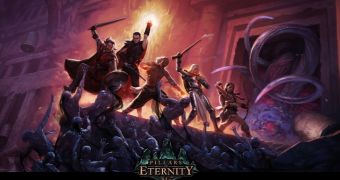One of the announcements that many people overlooked during the Game Developers Conference 2014 event was that Obsidian, the well-known role-playing game focused studio, was entering a deal with Paradox Interactive for the marketing and distribution elements linked to the new Pillars of Eternity.
The game, which was initially known only as Project Eternity, was one of the biggest game-related successes on the Kickstarter crowdfunding service, a shining example of how a studio can pitch an idea directly from its fans and get all the resources required to actually create it.
Obsidian has managed to put together a very solid pitch for its title and offer some cool rewards, while getting the money it initially asked for and then adding stretch goals almost as quickly as fans passed the previous milestones.
The team talked a lot about the value of its independence and how no traditional publisher was willing to put up the resources needed to deliver Pillars of Eternity to the market.
Since then, they have constantly communicated with players about the way the game was shaping up and explained all the core choices that they were making when it came to game world, lore, mechanics and other aspects of the title.
Publishers are not evil, just profit driven
The announcement that Pillars of Eternity will be marketed and distributed as a retail package by Paradox Interactive came with a lot of explanations: the development process will not be influenced in any way and Obsidian was to be consulted before any decision was made.
But the deal between the two companies shows that video game publishers, even if they have a rather negative reputation among players, have a big role to play in the industry because they have dedicated retail channels to appeal to and can create solid marketing that smaller studios might struggle with.
Paradox Interactive has a positive reputation mostly, but gamers should probably also try to see other companies, like Activision, Electronic Arts and Ubisoft, as profit driven rather than simply evil.
Their initial unwillingness to distribute Pillars of Eternity had nothing to do with hate for the genre or the potential player base, but with the limited commercial prospects of such a title.
Paradox has proven that it can do solid business with niche titles, like grand strategy, and that makes it a good fit for Obsidian.
The industry still needs big companies and their infrastructure
The image of the future of gaming as dominated by small, nimble, innovative teams that can create interesting experiences quickly and then deliver them to fans is certainly a very appealing one, but it will not become reality soon.
There are still barriers to launching titles and that means that publishers are still needed on the market, to ensure quality, to deliver physical copies to retailers, to market titles and to sometimes put up important resources.
Pillars of Eternity is shaping up nicely, judging from the information coming from Obsidian, and it will be interesting to see how the partnership with Paradox Interactive improves the overall game experience.
I also eagerly await the marketing campaign for the party-driven turn-based role-playing game, which both involved companies have claimed will be unique.

 14 DAY TRIAL //
14 DAY TRIAL //